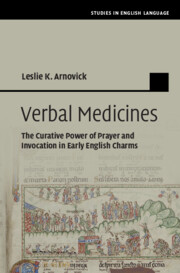Book contents
- Verbal Medicines
- Studies in English Language
- Verbal Medicines
- Copyright page
- Contents
- Figures
- Tables
- Introduction
- Chapter 1 Invoking Baptism
- Chapter 2 Psalm Charms as Aids against Illness
- Chapter 3 Invoking the Name of Mary
- Chapter 4 Invoking the Visitation of the Sick
- Chapter 5 The Multiplier Effect
- Chapter 6 Theoretical Implications
- Notes
- References
- Index
Chapter 6 - Theoretical Implications
Published online by Cambridge University Press: 29 November 2024
- Verbal Medicines
- Studies in English Language
- Verbal Medicines
- Copyright page
- Contents
- Figures
- Tables
- Introduction
- Chapter 1 Invoking Baptism
- Chapter 2 Psalm Charms as Aids against Illness
- Chapter 3 Invoking the Name of Mary
- Chapter 4 Invoking the Visitation of the Sick
- Chapter 5 The Multiplier Effect
- Chapter 6 Theoretical Implications
- Notes
- References
- Index
Summary
Chapter 6 explores charms’ re-purposing of liturgical texts from a theoretical perspective. The integrity of baptismal and Visitatio utterances and acts may be compromised, from a liturgical perspective, when they are reused for charm healing. The accommodations that result allow charms simultaneously to invoke those sacramental liturgies while accomplishing something different. As charms manipulate prayers and formulas extracted from liturgy for folk healing, the re-contextualization results in disparities. These prove important because they reveal the integration of ecclesiastical texts and gestures into traditional practices. When charms adapt particular liturgical texts and actions, the liturgical forms undergo a pragmatic-linguistic process of “de-institutionalization.” The loss of extra-linguistic context supports the charms’ discursive ends and reinforces its status as a distinct institution.
Keywords
- Type
- Chapter
- Information
- Verbal MedicinesThe Curative Power of Prayer and Invocation in Early English Charms, pp. 219 - 247Publisher: Cambridge University PressPrint publication year: 2024

